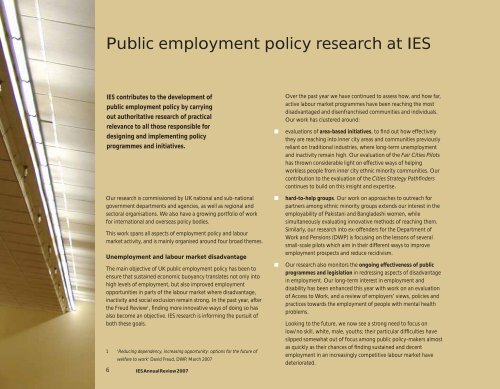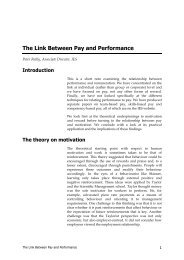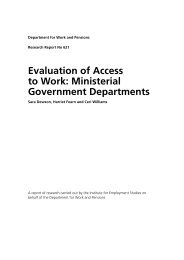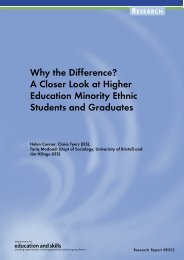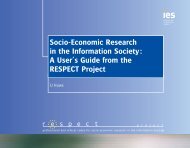PDF of this item - The Institute for Employment Studies
PDF of this item - The Institute for Employment Studies
PDF of this item - The Institute for Employment Studies
You also want an ePaper? Increase the reach of your titles
YUMPU automatically turns print PDFs into web optimized ePapers that Google loves.
Public employment policy research at IES<br />
IES contributes to the development <strong>of</strong><br />
public employment policy by carrying<br />
out authoritative research <strong>of</strong> practical<br />
relevance to all those responsible <strong>for</strong><br />
designing and implementing policy<br />
programmes and initiatives.<br />
Our research is commissioned by UK national and sub-national<br />
government departments and agencies, as well as regional and<br />
sectoral organisations. We also have a growing portfolio <strong>of</strong> work<br />
<strong>for</strong> international and overseas policy bodies.<br />
This work spans all aspects <strong>of</strong> employment policy and labour<br />
market activity, and is mainly organised around four broad themes.<br />
Unemployment and labour market disadvantage<br />
<strong>The</strong> main objective <strong>of</strong> UK public employment policy has been to<br />
ensure that sustained economic buoyancy translates not only into<br />
high levels <strong>of</strong> employment, but also improved employment<br />
opportunities in parts <strong>of</strong> the labour market where disadvantage,<br />
inactivity and social exclusion remain strong. In the past year, after<br />
the Freud Review 1 , finding more innovative ways <strong>of</strong> doing so has<br />
also become an objective. IES research is in<strong>for</strong>ming the pursuit <strong>of</strong><br />
both these goals.<br />
1 ‘Reducing dependency, increasing opportunity: options <strong>for</strong> the future <strong>of</strong><br />
welfare to work’ David Freud, DWP, March 2007<br />
6 IESAnnualReview2007<br />
■<br />
■<br />
■<br />
Over the past year we have continued to assess how, and how far,<br />
active labour market programmes have been reaching the most<br />
disadvantaged and disenfranchised communities and individuals.<br />
Our work has clustered around:<br />
evaluations <strong>of</strong> area-based initiatives, to find out how effectively<br />
they are reaching into inner city areas and communities previously<br />
reliant on traditional industries, where long-term unemployment<br />
and inactivity remain high. Our evaluation <strong>of</strong> the Fair Cities Pilots<br />
has thrown considerable light on effective ways <strong>of</strong> helping<br />
workless people from inner city ethnic minority communities. Our<br />
contribution to the evaluation <strong>of</strong> the Cities Strategy Pathfinders<br />
continues to build on <strong>this</strong> insight and expertise.<br />
hard-to-help groups. Our work on approaches to outreach <strong>for</strong><br />
partners among ethnic minority groups extends our interest in the<br />
employability <strong>of</strong> Pakistani and Bangladeshi women, while<br />
simultaneously evaluating innovative methods <strong>of</strong> reaching them.<br />
Similarly, our research into ex-<strong>of</strong>fenders <strong>for</strong> the Department <strong>of</strong><br />
Work and Pensions (DWP) is focusing on the lessons <strong>of</strong> several<br />
small-scale pilots which aim in their different ways to improve<br />
employment prospects and reduce recidivism.<br />
Our research also monitors the ongoing effectiveness <strong>of</strong> public<br />
programmes and legislation in redressing aspects <strong>of</strong> disadvantage<br />
in employment. Our long-term interest in employment and<br />
disability has been enhanced <strong>this</strong> year with work on an evaluation<br />
<strong>of</strong> Access to Work, and a review <strong>of</strong> employers’ views, policies and<br />
practices towards the employment <strong>of</strong> people with mental health<br />
problems.<br />
Looking to the future, we now see a strong need to focus on<br />
low/no skill, white, male, youths; their particular difficulties have<br />
slipped somewhat out <strong>of</strong> focus among public policy-makers almost<br />
as quickly as their chances <strong>of</strong> finding sustained and decent<br />
employment in an increasingly competitive labour market have<br />
deteriorated.


